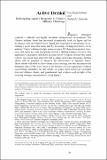Active Denial: Redesigning Japan's Response to China's Military Challenge
Author(s)
Heginbotham, Eric; Samuels, Richard J
Downloadisec_a_00313.pdf (198.6Kb)
PUBLISHER_POLICY
Publisher Policy
Article is made available in accordance with the publisher's policy and may be subject to US copyright law. Please refer to the publisher's site for terms of use.
Terms of use
Metadata
Show full item recordAbstract
The growth of Chinese military power poses significant challenges to Japan. China's military spending, which was half that of Japan's in 1996, is now three and a half times as large. Japan has taken a range of measures to buttress its military forces and loosen the restrictions on their operations, but much remains to be done. Most important, Tokyo needs to reexamine its strategy to maximize Japan's deterrent leverage. Of the three general approaches to conventional deterrence—punishment, forward defense, and denial—Japan's best option is to shift to a denial strategy. Such a strategy, built around a resilient force that can survive attack and attrite an encroaching adversary, can make the risks to a potential attacker unacceptably high. In Japan's case, such a strategy would leverage the inherent dangers that Beijing would face in contemplating a prolonged war against Japan and its U.S. ally. The strategy, updated to reflect the imperatives of air and maritime warfare in the precision strike era, would require a high level of dispersion and mobility and might therefore be labeled “active denial.” Adopting an active denial strategy would buttress Japan's defense and deterrent capability while reducing first-strike incentives and improving crisis stability.
Date issued
2018-05Department
Massachusetts Institute of Technology. Center for International Studies; Massachusetts Institute of Technology. Department of Political ScienceJournal
International Security
Publisher
MIT Press
Citation
Heginbotham, Eric, and Richard J. Samuels. “Active Denial: Redesigning Japan’s Response to China’s Military Challenge.” International Security, vol. 42, no. 04, May 2018, pp. 128–69.
Version: Final published version
ISSN
0162-2889
1531-4804